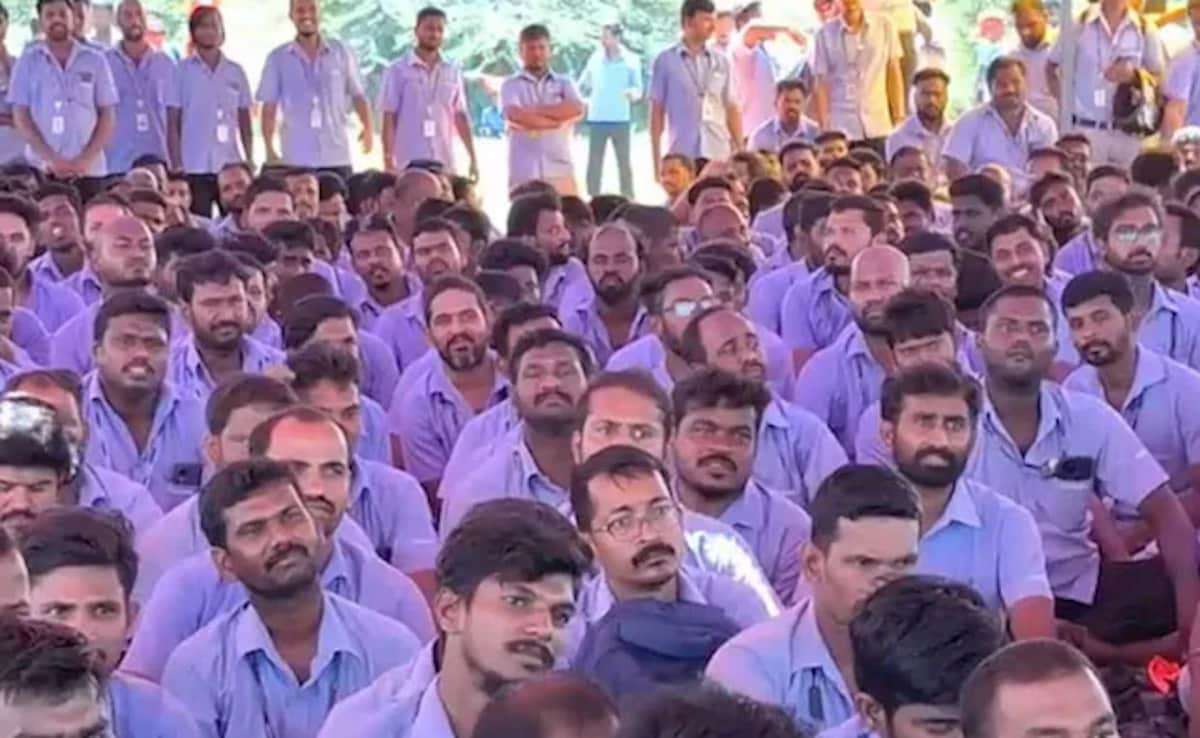
SP Rajendran
IN a significant victory for working class rights in India, the Samsung India Workers' Union (CITU) was officially registered on January 27, 2025, following a determined seven-month struggle symboliSing the resilience and unity of workers nationwide.
The journey began in June 2024 when over 1,800 permanent workers at Samsung's manufacturing facility in Sunguvarchatram, Kanchipuram district, Tamil Nadu, decided to unionise under the banner of the Centre of Indian Trade Unions (CITU). The facility, which produces home appliances such as washing machines, refrigerators, and televisions, is one of Samsung's two manufacturing units in India, the other being in Noida.
What should have been a straightforward 45-day registration process turned into a prolonged 212-day struggle, as state authorities appeared to align with corporate interests. Workers faced strong opposition from company management and encountered unexpected delays from the state labour department. Their resolve was put to the test when they were forced to stage protests two kilometers away from the factory, in Echur, where they demonstrated for over a month starting September 9, 2024.
LEGAL BATTLE AND
POLITICAL SUPPORT
CITU representatives attributed the prolonged struggle to Samsung India's unwillingness to uphold Indian labour laws that guarantee the right to unionisation and collective bargaining. They also expressed concern over the government's tacit support for the company's stance. A particularly contentious issue was Samsung’s refusal to acknowledge the term "union" during negotiations, even though the company had used the term in its own legal filings.
Under the Indian Trade Unions Act of 1926, workers have the fundamental right to form unions with as few as seven members. The law mandates that unions establish leadership positions, including president, secretary, and treasurer, along with an executive committee and proper bylaws. While initial registration requires only seven members, renewal necessitates the support of at least 10 per cent of the total workforce. Senior lawyers and union leaders have stressed that this provision applies uniformly to all companies operating in India.
The struggle reached a turning point when the case was brought before the Madras High Court. Senior advocates NGR Prasad and Sivakumar, representing CITU, forcefully argued for the workers' constitutional right to form a union. The court's intervention proved pivotal, with the judge questioning the unnecessary resistance to what should have been a routine legal process.
A breakthrough came on December 5, 2024, when the court ordered that action be taken on the union’s registration application within a specified timeframe. Although the Tamil Nadu government sought and was granted a six-week extension, the deadline was ultimately met, and the union received its official registration on January 27, 2025.
The trade union movement in Tamil Nadu, along with AIKS, AIDWA, and DYFI/SFI, launched continuous solidarity campaigns in support of the workers. The intervention of the Communist Party of India (Marxist) played a crucial role in garnering broader political backing for their cause. Leaders from various allied parties visited the protesting workers, expressing solidarity and pledging to push for a resolution. This mounting political pressure, coupled with the chief minister's eventual intervention, helped facilitate an agreement that allowed workers to resume their jobs while the legal fight for union recognition continued.
E Muthukumar, the union's president, received the registration certificate in Chennai, marking a major victory for Samsung workers and a precedent for labour rights in multinational companies. Workers celebrated with fireworks and sweets in Kanchipuram and Sunguvarchatram, led by CPI(M) district secretary K Nehru.
BROADER
IMPLICATIONS
This victory is a landmark moment in India's labour movement, challenging multinational corporations' resistance to unionisation. The 212-day struggle of Samsung workers proves that persistent, organised action can overcome corporate opposition, even from global companies with strong anti-union policies. The union’s registration sets a crucial precedent for India's manufacturing sector, particularly in electronics, reinforcing that all companies, regardless of their global influence, must respect Indian labour laws and workers' constitutional rights.
Union leaders A Soundararajan and E Muthukumar emphasized the historic significance of forming Samsung India's first registered majority union. They called on Samsung management to engage in meaningful dialogue with the union and urged the government to enforce labour laws on multinational companies. Additionally, they stressed the need for a clear government stance on workers' rights and reforms in police practices that often obstruct legitimate labour protests.
The registration of the Samsung India Workers' Union marks a significant shift in labour rights within India’s manufacturing sector. It demonstrates that, despite corporate resistance and state alignment with corporate interests, organised workers can assert their legal rights. As the first registered union at Samsung India, this victory sets a powerful precedent, encouraging similar efforts in other multinational corporations where workers have been hesitant to organise.
This 212-day struggle underscores that persistent, organised worker action can overcome even formidable corporate opposition. The union’s registration reinforces that all companies, whether multinational or domestic, must respect India's constitutional right to unionise and adhere to labour laws. Particularly in the advanced manufacturing sector, this achievement paves the way for stronger worker organisation and collective bargaining.
While this victory is historic, union leaders emphasize that it is only the beginning. The formal recognition of the union is a crucial step, but the larger fight for workers' rights and fair labour conditions continues. The union will serve as a key tool in ensuring long-term improvements in labour relations and workplace standards.
or reload the browser


